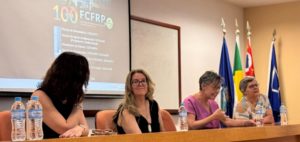On February 11, for the International Day of Women and Girls in Science, IUPAC hosted their annual Global Women’s Breakfast (GWB2025) at 449 events in 78 countries. The goal of “The Breakfast” is to establish an active network of people to overcome gender barriers in science. To this end, groups from all types of scientific organizations are invited to participate, from high schools to science societies, universities, companies, governments and non-governmental organizations. Together, this group represents solidarity with Women and Girls in Science, emphasizing that they are not alone and have support to thrive in their careers. Equity is key, and the motto for #GWB2025 was “Accelerating Equity in Science”.
In many countries, the Royal Society of Chemistry sponsors this event. This year, Brazil hosted a Global Women’s Breakfast at 11 different sites, and our Brazil manager, Elizabeth Magalhães, took part in one at the University of Sao Paulo. The organizers, Prof. Carmem Cardoso and Prof. Marilia Valli (FCFRP-USP), sponsored in part by the RSC Inclusion & Diversity Fund, hosted the breakfast service and a round table with regional scientists. Speaking at the roundtable were Prof. Susana Torresi (Chemistry Institute and deputy provost of research at University of Sao Paulo), Elizabeth Magalhães (RSC manager in Brazil), Prof. Rogéria Rocha Gonçalves (FFCLRP-USP) and Monica Tallarico Pupo (FCFRP-USP).

Round table with Prof. Pupo, Prof. Rogeria, Prof. Torresi, and Elizabeth.
The roundtable led to some engaging discussions. Prof. Torresi presented statistics on women working at University of Sao Paulo, at different campuses, areas, roles, stages and moments of their lives, to reflect on how affirmative activities can help. An important conclusion of this analysis was that STEM still has a big gap to overcome, compared to other departments such as the social sciences.
Elizabeth showed a study from RSC on women’s work missing from the literature in RSC publications.1 She also reported on the insertion of women in academic and corporative markets in the UK, which is increasing but still far from ideal.
Prof. Rogeria gave an overview of the specific numbers at the Ribeirão Preto campus of University of Sao Paulo, which includes facilities for social sciences, STEM, and biomedical sciences.
Finally, Prof. Pupo showed statistics for the fields of Natural Products and Medicinal Chemistry, putting light on women’s publications, thesis, projects, citations, and overall participation. The audience asked further questions, with the panel giving support to young aspiring scientists and talking about changes in science culture surrounding women.
A main takeaway from this event is that equity extends beyond equal representation numbers, but also includes unbiased behaviours based on gender, race, identification, age, and other superficial characteristics. Still, as Brazilian poet Caetano says, “it’s a long way …. it’s a long and winding road.” 2
- The Royal Society of Chemistry, 2019. IS PUBLISHING IN THE CHEMICAL SCIENCES GENDER BIASED ? Available: https://www.rsc.org/globalassets/04-campaigning-outreach/campaigning/gender-bias/gender-bias-report-final.pdf
- Caetano Veloso, 1972, It’s a Long Way. Listen: https://youtu.be/FGrkfY5voxg










